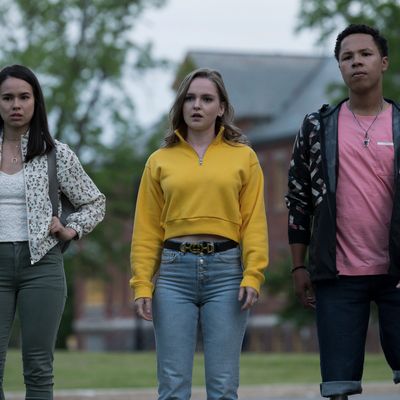
Vincenzo Natali (Cube, In the Tall Grass) directs the final two episodes of the first season of Locke & Key like one combined feature film. The director guides the season to its conclusion confidently, giving these two chapters all the necessary self-importance to end on a strong enough note to convince Netflix to bring the show back sooner than later. With the writers, Natali really imbues both chapters with an energy that the show has lacked much of this season, giving it the grandiosity of a Harry Potter or Lord of the Rings movie, while filling in a lot of the gaps as to how we got here.
Much of that background exposition comes courtesy of the Head Key being used on the mind of Ellie Whedon. After all, she knows more about what happened then and whatÔÇÖs been happening lately in Matheson than anyone else, so it makes sense that a journey through her mind would answer some of the questions of both the Locke kids and the viewers to set us up for the climactic finale. Although the episode starts with a traditional flashback to the day that Ellie learned about RendellÔÇÖs death and not a literal trip through EllieÔÇÖs head ÔÇö that comes later. It turns out that Ellie called Mark when she heard Rendell was dead, and thatÔÇÖs when Mark instantly set himself ablaze with the Matchstick Key so the secret locations of the keys would die with him. Intense commitment.
Filled in through flashbacks and use of the Head Key, we discover the role Ellie has played in all of this, and it makes sense to compress that a bit here ÔÇö letÔÇÖs just say that sheÔÇÖs not exactly wrong when she says itÔÇÖs all her fault. It turns out that she went down to the Black Door with her friends back when they were teenagers, and something shot out of the glowing door, hitting Lucas and turning him into something violent and almost possessed. Later that night, Lucas went crazy, killing Kim and Jeff. Rendell Locke killed Lucas, as his kids have seen in a memory jar, but it was to protect Ellie and stop Lucas from doing more damage. That left Ellie, Mark, Erin, and Rendell as the remaining keepers, who divided the keys and promised never to speak of this again. They threw the three bodies of their friends off the cliffs, and people believed the story that they drowned in the caves. Death investigations in Matheson seem a little incompetent.
Things went well for about two decades, with the exception of Erin getting literally stuck in her own head. Rendell Locke started a family in Seattle and Mark seemed happy enough before the call from Ellie. The problem is that Ellie Whedon was stuck in her depression in Matheson, getting lonely and looking for something to do. She became obsessed with bringing Lucas back to life, and used the Echo Key to do so, but it wasnÔÇÖt Lucas who returned ÔÇö it was the demon that had possessed him and turned him into a murderer. That demon then suckered Sam Lesser into killing Rendell Locke and trying to help the entity get the Omega Key. And now the demon known as Well Lady, Lucas, and Dodge is in its endgame to get that key and open the Black Door, and it needs something called the Crown of Shadows to do so.
In the present day, the older Locke kids learn theyÔÇÖre going to need some help. As everyone knows from pop culture ranging from Scooby Doo to Harry Potter, sometimes it takes a group of kids to defeat true evil. Even Rufus mentions that any good attack needs reinforcements. And so they loop Bode in on the chaos and then, largely because of the fear monster roaming the woods of Matheson, they end up telling Logan, Jackie, and even Eden about the keys and the magical world they unlock. Jackie is startled that Tyler didnÔÇÖt trust her earlier. Meanwhile, Kinsey tells Gabe and Scot that she wants to date both of them. How progressive.
In perhaps the most ÔÇ£huhÔÇØ narrative twist of a show with more than a few, it turns out that Dodge just leaves the magical keys sheÔÇÖs purloined in a plastic bag that Rufus easily finds. Whatever ÔÇö the writers needed the Head Key to ÔÇ£showÔÇØ the Locke kids the truth about what happened, so itÔÇÖs somewhat forgivable. ItÔÇÖs the Flower and Head Keys, and they will help the Locke kids not only learn the truth about Ellie and Lucas, but also help them trap the entity thatÔÇÖs been causing havoc in the well house. They also learn about a final crucial key, the key to the Crown of Shadows. It activates the crown that Ellie retrieved from Key House that day that Nina found her snooping around, and that crown creates powerful shadow demons that can be controlled by its wearer. In the final scenes, Lucas gets his hand on that key, locks it in place, and prepares for its final assault on the Black Door. Can the Locke kids and their reinforcements do anything to stop it?
Unlocked Doors
ÔÇó ItÔÇÖs always a little uncomfortable when writers use something like alcoholism as a quickie plot device, which it kind of feels like they did with Nina Locke, who fell off the wagon and then jumped right back on. As anyone who has dealt with addiction in their family knows, it often takes more than a plea from a child. They at least held up the pretense of having her almost go to an AA meeting, but thatÔÇÖs really just to have a meet-cute with the detective who poorly investigated Joe RidgewayÔÇÖs murder. (Seriously, we see Ridgeway kick on the ground as heÔÇÖs being suffocated. Did no one notice the scuff marks as signs of a struggle?)
ÔÇó Speaking of that, we do get to actually see Ridgeway killed by Lucas while Ellie watches, and then Lucas escapes using the Anywhere Key. This explains why Ellie was hiding out when Nina arrived. We had a good reason to be suspicious of her, but sheÔÇÖs kind of been a victim under LucasÔÇÖ control, too.
ÔÇó┬áFans of the source will know that the third book/series is called Crown of Shadows. TheyÔÇÖre really pulling from at least the first three series, which ran from 2008 to 2010.
ÔÇó Eden refers to ScotÔÇÖs group as the Santorini Squad instead of the Savini Squad, a funny mix-up. Santorini is an island in the Aegean Sea, off the Grecian mainland, and officially called Thera, although the Greeks still call it Santorini. Very different from Tom Savini.
ÔÇó┬áSherri Saum as Ellie Whedon does a lot to hold this episode together and deserves some praise for doing so. Much of her part is what we call an exposition dump, but she also sells the emotional turmoil of knowing that sheÔÇÖs to blame for a lot of the recent problems, including the deaths of her friends. The writing on this show often frustrates me, but the performances have been strong from top to bottom.


